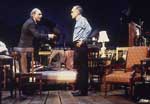
For my taste, Arthur Miller is at his best when he keeps off large topics, burning issues, poetic pretensions, and Marilyn Monroe. So it is that The Price has always struck me as one of his better efforts, eschewing – pretty much – the grand gesture and sticking to what Miller truly understands: family feuds and money.
Many years ago, the brothers Victor and Walter Franz, college students, were left with their widowed, hard-to-employ father in Depression-era poverty needing to be looked after. Walter selfishly charged ahead toward a career as a successful doctor, sending back a monthly $5 as blood money. Victor dropped out of school and ended up as a policeman. He took good care of Dad even though, as he now says, they had to eat garbage. Victor broke off communication with Walter sixteen years ago and is married to Esther. They have grown progeny (as does the now divorced Walter) and have managed a decent enough hardscrabble life.
Now Dad has died, the building is to be torn down, and years’ worth of accumulated furniture and other stuff is to be sold to Gregory Solomon, a dealer Victor found in an old phone book. Trying to reach Walter on the phone for division of the profit and disposal of items of sentimental value, Victor can never get past Walter’s nurse. As the play begins, the business must seemingly be conducted without Walter. Solomon, now 89, had given up his antiquarian and assessing business, but such a pile of goods proves irresistible to the still lively old man.
Act One is mostly about waiting for an estimate and offer, about reminiscences that Solomon, Victor, and Esther spill out to one another, and about some philosophizing from the shrewd geezer. Miller has said that the play concerns the significance of the past for the present, which we too often try to ignore. Fair enough, but it makes much of the proceedings, especially in Act One, exposition. Now, if the play must be iceberglike, with exposition the submerged past, it had better be an inverted iceberg. Seven-eighths underwater means too much diving in place; one measly eighth above water makes for too little action in the present and onstage.
So we get a very slow first act, aggravated by the poky staging of James Naughton, a fine actor but a novice director. He may also have deferred too much to Bob Dishy’s way with Solomon, whose pauses induce an unholy desire to goose him, if not into action, at least into talking faster.
Yet everything picks up in Act Two, when Walter arrives. Things percolate, hum, even race along. Cues are picked up avidly, as are old rancors and the sense that the $1,100 for which Victor agreed to sell is way too little. Now major, surprising revelations (some perhaps untrue) pop up fast as ducks in a shooting gallery, and the persons of the drama are as astonished and knocked sideways as the audience. The chief news is that dear old Dad had a considerable stash – $4,000 – which was known to Walter, but which he failed to communicate to his brother except by vague hints, wishing, as he puts it now, to leave it up to Dad to come clean.
This is a major problem. Walter makes all kinds of statements that could be taken as mitigation of guilt but could also be mere falsities to disguise envy, the wish he had to hold Victor down deliberately. On the other hand, Victor might have managed to continue his studies instead of merely yielding to a victim complex. As new twists come thick and fast, the author may exceed the playwright’s reasonable allotment of ambiguities, of unresolved questions. Or maybe not. How you feel about this will color your judgment of the work but won’t decrease your enjoyment of the good parts, of which there are not a few.
In such a four-character play, though, it is mandatory for every performance to be just right. Nobody could be a better Victor than Jeffrey DeMunn. He juggles the contrary emotions that run through this police sergeant (he is fiftyish, but outspokenness has kept him from promotions) with absolute assurance and, by never pleading for sympathy for either character or actor, makes the cop all the more sympathetic. Walter, however, because he’s thoroughly unsympathetic, must be played by an actor of greater skill and charm than Harris Yulin, whom one feels like hissing in virtually every role he plays.
The always greatly likable Lizbeth Mackay is so again as Esther, but savvy enough not to ignore the character’s edginess and, so to speak, nudgingness. As Solomon, Bob Dishy is much too frisky of gait and movement for a nonagenarian and, in Act One, too slow of speech for a centenarian. But he can be funny. Naughton’s direction is generally thoughtful, and the design elements fall nicely into place. Yet it seems to me that money, however important, plays too prominent a role in Miller’s plays, even here, where the Price of the title takes on several other meanings as well. But perhaps that is what is known as commercial theater.